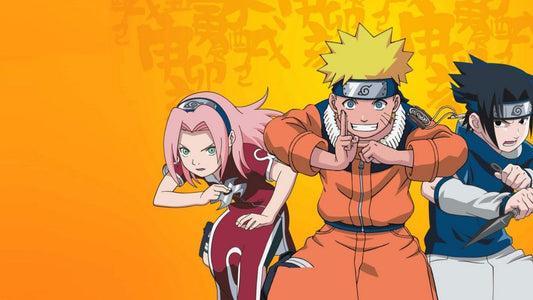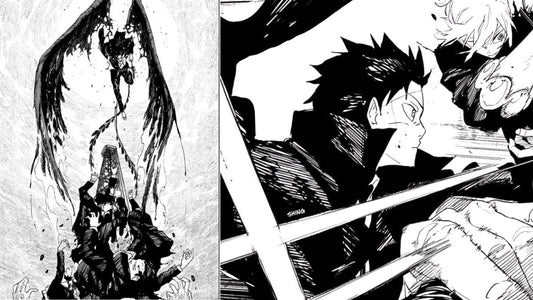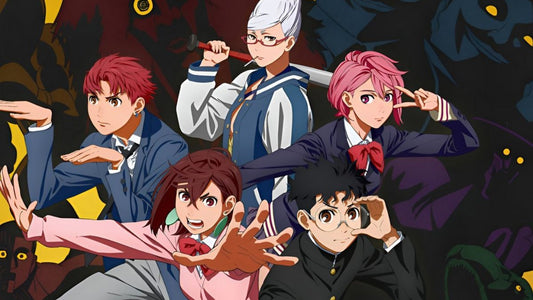
Denji's Cycle of Pain and Optimism in Chainsaw Man Chapter 184
Jared JohnsonShare
Denji's Cycle of Pain in Chainsaw Man Chapter 184
In the realm of manga, Chainsaw Man by Tatsuki Fujimoto consistently defies convention, blending horror, humor, and profound themes. Chapter 184, titled "Run, Denji," exemplifies this with its overt metaphor for Denji's life and ongoing struggles, both externally and within himself. The chapter serves as a reflection of Denji's journey, capturing the essence of his persistent cycle of finding and losing family, all while seeking a sense of belonging and purpose.
Denji's Recurrent Struggle and Newfound Optimism
Denji's journey throughout the Chainsaw Man series is marked by constant loss and cyclical pain, much like the Grecian myth of Sisyphus, who was eternally condemned to push a boulder uphill only for it to roll back down. In this chapter, Denji's decision to run in circles within the Aging Devil's World is more than a simple plan for escape. It symbolizes his acceptance of his cyclical fate—finding family, losing them, and being thrust back into loneliness.
This newfound acceptance is a rebellion against the endless cycle of hardships. Instead of succumbing to despair, Denji distinguishes himself by embracing each struggle with a surprising sense of optimism, fueled by his continuing connection to Pochita, a symbol of enduring friendship.
For those interested in this fascinating recurring theme, MyAnimeList provides in-depth discussions and community insights about Denji’s journey.
Character Development Amidst Stagnation
While Chapter 184 appears stagnant in terms of plot progression, it delves deeply into character development, particularly the dynamic between Denji, Yoru, and Asa. Despite being marginalized by the primary focus on Denji's cyclic struggle, Asa and Yoru benefit from a bonding moment that enriches their previously tumultuous relationship.
The pair, trapped in the same existential plight as Denji, reflects on their past conflicts and ideological splits, such as during the Chaos Devil arc. Their interaction in this chapter hints at a growing mutual understanding, emphasizing the complexity of their relationship and offering a fresh perspective amid the chaos of their environment.
For a closer examination of Asa and Yoru's evolving relationship, see the Manga Online character analysis section.
The Metaphoric Stagnation and Narrative Implications
Denji's repetitive laps around the lake serve as a powerful metaphor for his life's perpetual loop of chaos and resilience. Though some may view the chapter as an episode of narrative inertia, its artistic intention is to immerse readers into Denji's mindset—a constant forward motion with seemingly no progress.
The chapter’s reflective tone offers an exploration of Denji’s introspection and emotional grappling. The visual focus on Denji’s stomach in the final panels subtly suggests a potential development or breakthrough through an unexpected medium: physical exertion leading to visceral revelations.
As this installment lingers on metaphoric and introspective themes, its consistency with the narrative’s broader tendencies towards shōnen style inspiration cannot be overlooked. Interested readers can find a detailed discussion on these stylistic choices on Viz's official site.
Conclusion: An Exploration of Cycles in Chainsaw Man
Chapter 184 of Chainsaw Man may feel like an interlude in terms of sheer action or narrative advancement, but it serves as a profound commentary on Denji's life, playing with the idea of cycles—both painful and potentially liberating. While Fujimoto occasionally brings the series full circle with familiar themes, he continues to challenge conventional storytelling, making Chainsaw Man an ever-engaging series to follow.
Ultimately, "Run, Denji" is a testament to Fujimoto's ability to craft stories that blend conventional manga elements with deeply personal and existential themes, offering fans a chance to ponder the hero's relentless battles, both exterior and interior.
For a more comprehensive look at Denji’s character progression, see Anime Planet for reviews and discussions on recent chapters.



